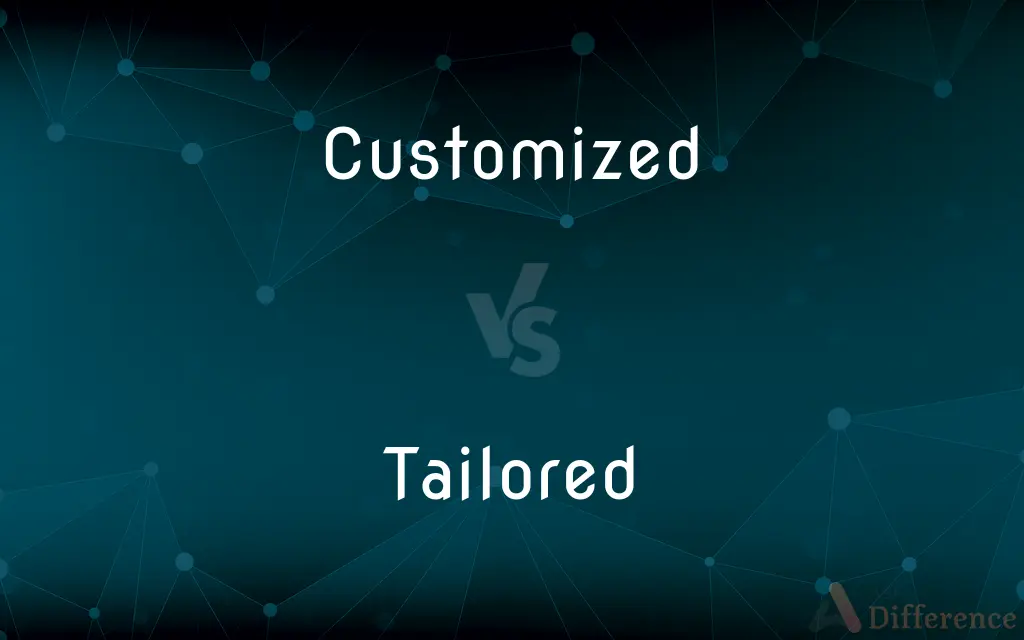Customized vs. Tailored — What's the Difference?
By Tayyaba Rehman & Urooj Arif — Updated on March 27, 2024
Customized refers to modifying something to meet specific needs or preferences, while tailored specifically implies alterations made to fit an individual’s measurements or style, often with clothing.

Difference Between Customized and Tailored
Table of Contents
ADVERTISEMENT
Key Differences
Customization involves altering or creating products, services, or experiences to suit the unique preferences or requirements of an individual or group. This process can apply to a wide range of items, including software, vehicles, and personal services, emphasizing the aspect of personal choice and specificity in the modification.
Tailoring, while a form of customization, traditionally focuses on adjusting clothing to fit an individual's body shape precisely. The term has expanded to include any service or product adjusted to meet specific individual needs closely, but it retains a strong association with personal apparel and craftsmanship.
Customized products or services might not always require direct human craftsmanship but could involve selecting options within a predefined set of choices. In contrast, tailored items typically suggest a higher degree of personal attention and skill, especially in the context of clothing, where the fit and details are adjusted by a professional tailor.
The concept of customization is broader and can include internal changes that don’t affect the outward appearance, such as software settings, car engine modifications, or the configuration of a service. Tailoring, however, usually results in changes that are both functional and aesthetic, ensuring the end product not only fits perfectly but also looks as if it was made specifically for the individual.
While both customization and tailoring enhance the user experience by providing a personal touch, tailoring suggests a more traditional, artisanal approach, often implying a higher level of detail and craftsmanship. Customization, by contrast, emphasizes the ability to meet the user's demands through a variety of modifications, potentially involving both human and technological processes.
ADVERTISEMENT
Comparison Chart
Definition
Modifying something to meet specific preferences or needs.
Specifically altering something, often clothing, to fit an individual.
Application
Broad, applies to products, services, and experiences.
Traditionally associated with clothing but can apply to services/products for specific needs.
Implication
Can involve a range of modifications, from surface to functional.
Implies adjustments for a perfect fit, especially in clothing.
Process
May involve selecting options or features; not necessarily handmade.
Suggests personal attention and craftsmanship, often handmade.
Outcome
A product or service that meets the user's specifications.
An item that fits an individual's measurements or style precisely.
Compare with Definitions
Customized
Adapting a product to the customer's specific needs.
Customized software can include user-specific features.
Tailored
Adjusting clothing to fit precisely.
A tailored suit is altered to match the wearer's measurements perfectly.
Customized
Broad in application, from tech to services.
A customized meal plan caters to individual dietary requirements.
Tailored
Implies artisanal craftsmanship.
Tailored garments often involve hand-sewn adjustments.
Customized
Focuses on user preference and functionality.
Customized cars might feature unique paint jobs and engine upgrades.
Tailored
Focuses on fit and aesthetics.
Tailored curtains are made to fit the exact dimensions of a window.
Customized
May involve a variety of changes.
Customized education programs adapt to each student's learning pace.
Tailored
Represents a high level of personalization.
Tailored experiences cater to the individual's preferences in detail.
Customized
Provides a personal touch.
Customized gifts are tailored to the recipient's interests.
Tailored
Can extend to services for individual needs.
Tailored financial advice is specific to one's financial situation.
Customized
To make or alter to individual or personal specifications
Customize a van.
Tailored
(of clothes) smart, fitted, and well cut
A tailored charcoal-grey suit
Customized
Simple past tense and past participle of customize
Tailored
Made by a tailor; custom-made.
Customized
Made according to the specifications of an individual
Tailored
Simple, trim, or severe in line or design
A neat, tailored dress.
Tailored curtains.
Tailored
Adjusted by a tailor, fitted.
Tailored
Made by a tailor.
His expensive tailored shirts didn't look that much better than off-the-rack, but they lasted much longer.
Tailored
Simple past tense and past participle of tailor
Tailored
Severely simple in line or design;
A neat tailored suit
Tailored curtains
Tailored
Of clothing
Common Curiosities
How does tailored clothing differ from off-the-rack?
Tailored clothing is adjusted or made to fit an individual's body measurements, unlike off-the-rack items, which are made to standard sizes.
What makes a product customized?
A product is customized when it has been modified or designed to meet specific requirements or preferences of the user.
Is tailored more expensive than customized?
Tailored, especially in the context of clothing, often implies a higher degree of craftsmanship and personalization, which can be more expensive than standard customization processes.
Can technology be tailored?
While technology is more often described as customized, services or software can be "tailored" to fit specific needs, especially when personalized support or design is involved.
Can a service be both customized and tailored?
Yes, a service can be both customized and tailored when it is designed to meet general preferences and also adjusted to fit very specific individual requirements or conditions.
What's an example of a tailored product outside of clothing?
Tailored financial plans, which are designed to fit an individual's unique financial situation and goals, are an example of tailored products beyond clothing.
Can digital products be customized or tailored?
Yes, digital products can be both customized and tailored. Customization can involve user-selected settings and features, while tailoring might refer to software or services designed to meet the precise needs of an individual user or organization.
What are the challenges of offering tailored services?
Challenges include the need for skilled labor, higher costs, longer production times, and the complexity of meeting very specific requirements accurately.
How does the process of customizing a product start?
The customization process often starts with understanding the customer's needs or preferences, followed by selecting or suggesting modifications that can meet those specifications within the available options.
Why might someone choose a customized option?
Someone might choose a customized option to ensure the product or service meets their specific needs, preferences, or tastes, enhancing satisfaction and effectiveness.
How do companies offer customized products?
Companies offer customized products by allowing customers to select features, designs, or components that meet their specific preferences or requirements.
What does it mean to have something tailored?
Having something tailored means adjusting or making it specifically to fit one's measurements, style preferences, or particular needs, often implying a high level of personal attention and craftsmanship.
Is there a difference between custom-made and customized?
Yes, custom-made typically refers to something made from scratch to meet specific requirements, while customized might involve modifying an existing product to better suit the user's needs.
What industries commonly use tailoring?
Beyond the fashion industry, tailoring is common in financial services, personalized healthcare, bespoke travel experiences, and any service industry that values individual preference and precise adjustments.
How do customization and tailoring affect consumer satisfaction?
Both customization and tailoring significantly enhance consumer satisfaction by providing products or services that meet individual preferences and requirements, leading to a more personal and fulfilling user experience.
Why might businesses prefer to offer customized or tailored products?
Businesses might prefer to offer these products to stand out in the market, cater to niche audiences, command higher prices due to the added value, and increase customer loyalty through personalized experiences.
Can food be customized or tailored?
Yes, food can be both customized (such as selecting toppings for a pizza) and tailored (such as creating a diet plan suited to an individual's health needs or preferences).
Share Your Discovery

Previous Comparison
Land vs. Water
Next Comparison
Armhole vs. ArmscyeAuthor Spotlight
Written by
Tayyaba RehmanTayyaba Rehman is a distinguished writer, currently serving as a primary contributor to askdifference.com. As a researcher in semantics and etymology, Tayyaba's passion for the complexity of languages and their distinctions has found a perfect home on the platform. Tayyaba delves into the intricacies of language, distinguishing between commonly confused words and phrases, thereby providing clarity for readers worldwide.
Co-written by
Urooj ArifUrooj is a skilled content writer at Ask Difference, known for her exceptional ability to simplify complex topics into engaging and informative content. With a passion for research and a flair for clear, concise writing, she consistently delivers articles that resonate with our diverse audience.














































